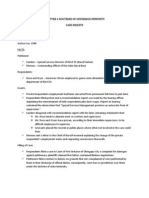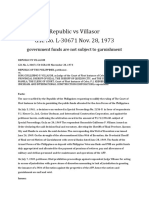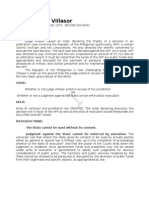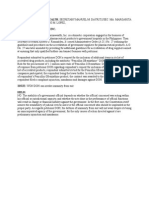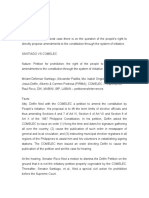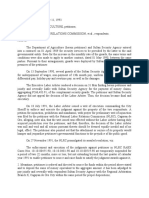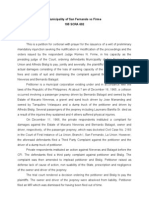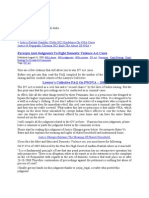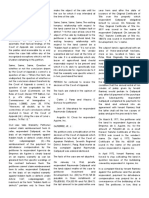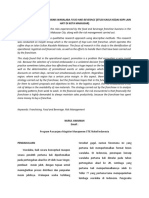Department of Agriculture Vs NLRC
Department of Agriculture Vs NLRC
Uploaded by
rodel_odzCopyright:
Available Formats
Department of Agriculture Vs NLRC
Department of Agriculture Vs NLRC
Uploaded by
rodel_odzOriginal Title
Copyright
Available Formats
Share this document
Did you find this document useful?
Is this content inappropriate?
Copyright:
Available Formats
Department of Agriculture Vs NLRC
Department of Agriculture Vs NLRC
Uploaded by
rodel_odzCopyright:
Available Formats
Department of Agriculture VS NLRC
G.R. No. 104269
FACTS: On November 27, 1991, the Department of Agriculture seeks to nullify the Resolution of the National Labor Relations Commission (NLRC), Fifth Division, Cagayan de Oro City, denying the petition for injunction, prohibition and mandamus that prays to enjoin permanently the NLRC's Regional Arbitration Branch X and Cagayan de Oro City Sheriff from enforcing the decision of 31 May 1991 of the Executive Labor Arbiter and from attaching and executing on petitioner's property. On April1, 1989, The Department of Agriculture (herein petitioner) and Sultan Security Agency entered into a contract for security services to be provided by the latter to the said governmental entity. The same terms and conditions were also made to apply to another contract or the increase in the monthly rate of the guards. The guards were deployed by Sultan Agency in the various premises of the petitioner in pursuant to their arrangements. On 13 September 1990, several guards of the Sultan Security Agency filed a complaint for underpayment of wages, non-payment of 13th month pay, uniform allowances, night shift differential pay, holiday pay and overtime pay, as well as for damages against the Department of Agriculture and Sultan Security Agency. On May 31, 1991, the Executive Labor Arbiter rendered a decision, finding the petitioner liable with the Sultan Agency for the payment of the money claims, aggregating P266, 483.91, of the complainant. The petitioner and Sultan Agency did not appeal the decision of the labor Arbiter. Thus, the decision became final and executory. On 18 July 1991, the Labor Arbiter issued a writ of execution. Commanding the City Sheriff to enforce and execute the judgment against the property of the two respondents. On 19 July 1991, the City Sheriff levied on execution the motor vehicles of the petitioner, one (1) unit Toyota Hi-Ace, one (1) unit Toyota Mini Cruiser, and one (1) unit Toyota Crown. These units were put under the custody of Zacharias Roa, the property
custodian of the petitioner, pending their sale at public auction or the final settlement of the case, whichever would come first. A petition for injunction, prohibition and mandamus, with prayer for preliminary writ of injunction was filed by the petitioner with the National Labor Relations Commission (NLRC), Cagayan de Oro, alleging, inter alia, that the writ issued was effected without the Labor Arbiter having duly acquired jurisdiction over the petitioner, and that, therefore, the decision of the Labor Arbiter was null and void and all actions pursuant thereto should be deemed equally invalid and of no legal, effect. The petitioner also pointed out that the attachment or seizure of its property would hamper and jeopardize petitioner's governmental functions to the prejudice of the public good. ISSUE: 1. Whether or not the doctrine of non-suability applies? 2. Whether the Department of Agriculture can be sued
HELD: 1. No. The rule is not really absolute for it does not say that the state may not be sued under any circumstance. The doctrine only conveys that the State may not be sued without its consent. It is clear import then is that the State may at times be sued. The States consent may be given either expressly or impliedly. Express consent may be made through general law or a special law. In this jurisdiction, the general law waiving the immunity of the state from suit is found in Act No. 3083, where the Philippine government consents and submits to be sued upon any money claim involving liability arising from the contract, express or implied, which could serve as a basis of civil action between private parties. Implied consent, on the other hand, is conceded when the State itself commences litigation, opening itself to a counterclaim or when it enters into a contract.
2. Under the Constitution, it says that the State cannot be sued without its consent. This simply means that a sovereign is exempt from suit on the ground that there can be no legal right as against the authority that makes the law on which the right depends. This doctrine is also called the royal prerogative of dishonesty because it grants the State the prerogative to defeat any legitimate claim against it by simply invoking its non-suability this rule is not really absolute for it does not say that state may not be sued under any circumstances. The States consent may be given expressly or impliedly. Express consent may be made through a general law or special law. On the other hand, implied consent is when the State itself commences litigation, thus opening itself to a counterclaim, or when it enters in to a contract In the CAB, the claims of the security guards arising from the Contract for Service, clearly constitute money claims. Under Act No. 3083, a general law, the State consents and submits to be sued upon any moneyed claim involving liability arising from contract, express or implied. However, the money claim must first be brought to the Commission on Audit. The court grants the petition.
You might also like
- Web Design Agreement TemplateDocument4 pagesWeb Design Agreement TemplateMartin SawinskiNo ratings yet
- Govt. of The Phil v. Montividad 35 Phil 728 ScraDocument25 pagesGovt. of The Phil v. Montividad 35 Phil 728 ScraPierreNo ratings yet
- LAWYERS LEAGUE vs. Aquino PDFDocument3 pagesLAWYERS LEAGUE vs. Aquino PDFhananiel san juanNo ratings yet
- 1.pvta Vs Cir 65 Scra 416 - Consti 1Document1 page1.pvta Vs Cir 65 Scra 416 - Consti 1MarkAnthonyTanCalimagNo ratings yet
- Lawyers League Vs Aquino G.R. No. 73748 - May 22, 1986Document1 pageLawyers League Vs Aquino G.R. No. 73748 - May 22, 1986code4sale100% (3)
- Sanders vs. Veridiano Case DigestsDocument4 pagesSanders vs. Veridiano Case DigestsBrian Balio50% (2)
- Republic of The Philippines vs. Villasor GR No. L 30671Document2 pagesRepublic of The Philippines vs. Villasor GR No. L 30671Zonix Lomboy100% (4)
- Lim Vs BrownellDocument2 pagesLim Vs Brownellrodel_odz67% (3)
- Carleton University Final Examination: Final Exam General InstructionsDocument8 pagesCarleton University Final Examination: Final Exam General InstructionsHao FanNo ratings yet
- Case Digest Department of Agriculture Vs NLRCDocument3 pagesCase Digest Department of Agriculture Vs NLRCLang Banac Limocon50% (2)
- DA Vs NLRCDocument13 pagesDA Vs NLRCJona ReyesNo ratings yet
- 20.republic vs. Feliciano, 148 SCRA 424Document7 pages20.republic vs. Feliciano, 148 SCRA 424JTupak100% (3)
- Govt of Phil Islands Vs Monte de PiedadDocument1 pageGovt of Phil Islands Vs Monte de PiedadNoreen NombsNo ratings yet
- 136 Scra 487 - Us Vs RuizDocument7 pages136 Scra 487 - Us Vs RuizMj Garcia100% (1)
- Magallona vs. Ermita G.R No. 187167 August 16 2011Document2 pagesMagallona vs. Ermita G.R No. 187167 August 16 2011Lex Acads100% (4)
- 5.begoso v. PVA 32 SCRA 466Document1 page5.begoso v. PVA 32 SCRA 466Maan LaspinasNo ratings yet
- Republic Vs VillasorDocument1 pageRepublic Vs VillasorBeverly Jane H. Bulanday50% (2)
- Digest ImmunityDocument47 pagesDigest ImmunityPeanutButter 'n Jelly100% (1)
- Digest 5 - Veterans Manpower and Protective Services, Inc. vs. CA, Sept 25, 1992Document2 pagesDigest 5 - Veterans Manpower and Protective Services, Inc. vs. CA, Sept 25, 1992Cattleya100% (1)
- Bacani vs. NacocoDocument2 pagesBacani vs. NacocoGary VelasquezNo ratings yet
- Valles V ComelecDocument6 pagesValles V Comelecpoet_07100% (2)
- DOH v. Philippine Pharmawealth Inc.Document1 pageDOH v. Philippine Pharmawealth Inc.Mijo SolisNo ratings yet
- Consti CaseDocument52 pagesConsti CaseTania FrenchNo ratings yet
- Poe VS ComelecDocument2 pagesPoe VS Comelecmario navalez100% (1)
- Separation of Powers DigestDocument7 pagesSeparation of Powers DigestSean Carlo Rey Loriega100% (1)
- Nha vs. GuivelondoDocument3 pagesNha vs. GuivelondokmanligoyNo ratings yet
- Municipality of San Fernando Vs FirmeDocument2 pagesMunicipality of San Fernando Vs FirmeIvan ValcosNo ratings yet
- 1 Republic Vs Villasor 54 Scra 83Document3 pages1 Republic Vs Villasor 54 Scra 83PrincessAngelicaMoradoNo ratings yet
- Inchong VS HernandezDocument1 pageInchong VS HernandezRoss LyneNo ratings yet
- Phil. Virginia Tobacco Administration v. CIR, G.R. No. L-32052, July 25, 1975. Full TextDocument8 pagesPhil. Virginia Tobacco Administration v. CIR, G.R. No. L-32052, July 25, 1975. Full TextRyuzaki HidekiNo ratings yet
- BACANI V NACOCO Case DigestDocument3 pagesBACANI V NACOCO Case DigestAndriel Gayle P. Yulo50% (2)
- People vs. Gozo (Art. II, Sec. 1)Document1 pagePeople vs. Gozo (Art. II, Sec. 1)KELVINNo ratings yet
- Consti CasesDocument25 pagesConsti CasesAGLD100% (3)
- Festejo vs. FernandoDocument1 pageFestejo vs. FernandoEric Guzman GuinirNo ratings yet
- Province of North Cotabato Vs Government of The Republic of The PhilippinesDocument2 pagesProvince of North Cotabato Vs Government of The Republic of The PhilippinesMarianne Serrano100% (1)
- Co Kim Chan VS Valdez Tan KehDocument2 pagesCo Kim Chan VS Valdez Tan KehMichelle Fajardo100% (4)
- Province of North Cotabato Vs Government of The Republic of The Philippines (G.R. No. 183591. October 14 2008)Document2 pagesProvince of North Cotabato Vs Government of The Republic of The Philippines (G.R. No. 183591. October 14 2008)Victoria Escobal50% (2)
- Government of The Philippine Islands V. El Monte de PiedadDocument5 pagesGovernment of The Philippine Islands V. El Monte de PiedadIvy ParillaNo ratings yet
- Merritt Vs Government of The Philippine IslandsDocument1 pageMerritt Vs Government of The Philippine IslandsprincessF0717100% (1)
- Sanidad vs. ComelecDocument2 pagesSanidad vs. ComelecelCrisNo ratings yet
- Case Digests (SuabilityDocument23 pagesCase Digests (SuabilityAngelineNo ratings yet
- Gonzales vs. Hechanova, 9 SCRA 230, (1963)Document2 pagesGonzales vs. Hechanova, 9 SCRA 230, (1963)Madelinia100% (3)
- Mobil Philippines Exploration, Inc. vs. Customs Arrastre Service and Bureau of CustomsDocument2 pagesMobil Philippines Exploration, Inc. vs. Customs Arrastre Service and Bureau of CustomsJay EmmanuelNo ratings yet
- Pamatong Vs COMELEC DigestDocument2 pagesPamatong Vs COMELEC Digestapplewithme100% (3)
- EPG Construction Vs VigilarDocument2 pagesEPG Construction Vs VigilarcymonNo ratings yet
- Ruffy vs. Chief of Staff 75 Phil 87Document2 pagesRuffy vs. Chief of Staff 75 Phil 87Jomar TenezaNo ratings yet
- Angara vs. Electoral Commission Case Digest 1Document1 pageAngara vs. Electoral Commission Case Digest 1Bai Amira HadjiesmaelNo ratings yet
- Philrock Vs Board of LiquidatorsDocument1 pagePhilrock Vs Board of LiquidatorsZonix LomboyNo ratings yet
- Ymbong Vs Ochoa, GR. No. 294819, April 8, 2014Document101 pagesYmbong Vs Ochoa, GR. No. 294819, April 8, 2014Noreen Joyce J. PepinoNo ratings yet
- Consti DoctrinesDocument79 pagesConsti DoctrinesJohndale de los Santos100% (1)
- Bureau of PrintingDocument1 pageBureau of PrintingElden Cunanan BonillaNo ratings yet
- US v. RuizDocument1 pageUS v. RuizJ. Jimenez100% (1)
- Estrada Vs DesiertoDocument2 pagesEstrada Vs DesiertoGelo Senarlo100% (1)
- Tondo Medical v. CADocument1 pageTondo Medical v. CAKarisse ViajeNo ratings yet
- Ruffy v. Chief of StaffDocument2 pagesRuffy v. Chief of StaffFred Michael L. GoNo ratings yet
- Digest 03 - DOH V Phil PharmaWealth - GR 182358 - February 20 2013Document2 pagesDigest 03 - DOH V Phil PharmaWealth - GR 182358 - February 20 2013Kriska Herrero Tumamak100% (2)
- DIGEST Santiago v. ComelecDocument5 pagesDIGEST Santiago v. ComelecMeet MeatNo ratings yet
- Republic vs. Feliciano (Case Digest) - Trugillo Eh 306 (Volunteer)Document2 pagesRepublic vs. Feliciano (Case Digest) - Trugillo Eh 306 (Volunteer)NocQuisaotNo ratings yet
- Estrada Vs Desierto G.R. No. 146710-15 : FactsDocument2 pagesEstrada Vs Desierto G.R. No. 146710-15 : Factsrunish venganzaNo ratings yet
- Consti Up vs. DizonDocument2 pagesConsti Up vs. DizonPafra Bariuan100% (2)
- Case Digest 7-8Document6 pagesCase Digest 7-8Erwin April MidsapakNo ratings yet
- Department of Agriculture vs. NLRC - Full TextDocument4 pagesDepartment of Agriculture vs. NLRC - Full TextQueenieNo ratings yet
- DAR Vs NLRCDocument15 pagesDAR Vs NLRCArjay ElnasNo ratings yet
- Administrative Law Case Digests Part3Document43 pagesAdministrative Law Case Digests Part3rodel_odzNo ratings yet
- Domino Vs ComelecDocument2 pagesDomino Vs Comelecrodel_odz100% (1)
- Japson Vs ComelecDocument2 pagesJapson Vs Comelecrodel_odzNo ratings yet
- People vs. MerisDocument8 pagesPeople vs. Merisrodel_odzNo ratings yet
- Atienza Vs COMELECDocument2 pagesAtienza Vs COMELECrodel_odzNo ratings yet
- Bongcaca vs. SandiganbayanDocument4 pagesBongcaca vs. Sandiganbayanrodel_odzNo ratings yet
- Cojuangco vs. SandiganbayanDocument11 pagesCojuangco vs. Sandiganbayanrodel_odzNo ratings yet
- Republic of Indonesia Vs VinzonDocument3 pagesRepublic of Indonesia Vs Vinzonrodel_odzNo ratings yet
- Municipality of San Fernando Vs FirmeDocument2 pagesMunicipality of San Fernando Vs Firmerodel_odzNo ratings yet
- National Airports Corp Vs TeodoroDocument2 pagesNational Airports Corp Vs Teodororodel_odz100% (1)
- Free Telephone Workers Union Vs Minister of LaborDocument2 pagesFree Telephone Workers Union Vs Minister of Laborrodel_odzNo ratings yet
- Magallona Vs ErmitaDocument3 pagesMagallona Vs Ermitarodel_odzNo ratings yet
- Bacani and Matoto VsDocument3 pagesBacani and Matoto Vsrodel_odzNo ratings yet
- Mobil Philippines Exploration Inc Vs Customs Arrastre ServiceDocument2 pagesMobil Philippines Exploration Inc Vs Customs Arrastre Servicerodel_odz100% (2)
- Right of The Persons With Disability ToDocument6 pagesRight of The Persons With Disability ToUtkarsh ShubhamNo ratings yet
- Civil Law Review 2Document50 pagesCivil Law Review 2romarcambri100% (1)
- Ipc 498a ..Document34 pagesIpc 498a ..Sumit Narang0% (1)
- The Municipality of Tangkal vs. BalindongDocument3 pagesThe Municipality of Tangkal vs. BalindongzaneNo ratings yet
- Special Proceedings - Settlement of Estates - Case DigestsDocument8 pagesSpecial Proceedings - Settlement of Estates - Case DigestsRoxanne PeñaNo ratings yet
- Mcafee Protective Order Georgia Vs Trump Et AlDocument8 pagesMcafee Protective Order Georgia Vs Trump Et AlLindsey BasyeNo ratings yet
- Investment & Dev. Inc vs. CADocument3 pagesInvestment & Dev. Inc vs. CAangel robedilloNo ratings yet
- James Thomas Patterson, Sr. v. Lawrence L. Aiken, 841 F.2d 386, 11th Cir. (1988)Document3 pagesJames Thomas Patterson, Sr. v. Lawrence L. Aiken, 841 F.2d 386, 11th Cir. (1988)Scribd Government DocsNo ratings yet
- RULE 61 of SCADocument26 pagesRULE 61 of SCASjaneyNo ratings yet
- Case Analysis On Kedarnath Vs State of Bihar: Submitted byDocument6 pagesCase Analysis On Kedarnath Vs State of Bihar: Submitted byPratik BasisthaNo ratings yet
- Tender NoDocument143 pagesTender NojaiNo ratings yet
- Manajemen Resiko Pada Bisnis Waralaba Food and Beverage (Studi Kasus Kedai Kopi Lain Hati Di Kota Makassar)Document14 pagesManajemen Resiko Pada Bisnis Waralaba Food and Beverage (Studi Kasus Kedai Kopi Lain Hati Di Kota Makassar)Andrew KresnaNo ratings yet
- Legal Profession Reviewer MidtermsDocument7 pagesLegal Profession Reviewer MidtermslynnzieabrahamnadongNo ratings yet
- Yablon CivPro Fall 2019Document82 pagesYablon CivPro Fall 2019Todd100% (2)
- May 22nd Pleadings - EngDocument124 pagesMay 22nd Pleadings - EngMichaelNo ratings yet
- Ivoclar Vivadent Et. Al. v. Dentsply International Et. Al.Document9 pagesIvoclar Vivadent Et. Al. v. Dentsply International Et. Al.Patent LitigationNo ratings yet
- Legal Writing - Homework (Nov. 7)Document7 pagesLegal Writing - Homework (Nov. 7)Isabella RagazaNo ratings yet
- Luminag Vs Belen A.M. No. RTJ-10-2216 Dept 23 2014Document4 pagesLuminag Vs Belen A.M. No. RTJ-10-2216 Dept 23 2014Michelle DecedaNo ratings yet
- FINAL DECISION 2021 No 36app Sabur Burrows V The Queen With CitationDocument6 pagesFINAL DECISION 2021 No 36app Sabur Burrows V The Queen With CitationBernewsAdminNo ratings yet
- GR No. 205664Document3 pagesGR No. 205664KIM COLLEEN MIRABUENANo ratings yet
- ResponseDocument2 pagesResponseattorneyinmichigan@yahoo.comNo ratings yet
- Edexcel Level 5 - Assignment Aspect of Contract and Negligence For BusinessDocument16 pagesEdexcel Level 5 - Assignment Aspect of Contract and Negligence For BusinessDasuni WeerarathneNo ratings yet
- Arbitration NoticeDocument2 pagesArbitration Noticenag0_3No ratings yet
- Largest Drug Bust in WNYDocument29 pagesLargest Drug Bust in WNYWGRZ-TVNo ratings yet
- Note Purchase Agreement Template-With CapDocument14 pagesNote Purchase Agreement Template-With CapDavid Jay Mor50% (2)
- Jennifer Agostini CaseDocument2 pagesJennifer Agostini CaseErin LaviolaNo ratings yet
- Globe Mckay Vs CADocument13 pagesGlobe Mckay Vs CADeb BieNo ratings yet
- Jeffrey A Sheppard, Age 62 in O Fallon, IL, (618) 206-8206Document1 pageJeffrey A Sheppard, Age 62 in O Fallon, IL, (618) 206-8206fujiplcfykjgNo ratings yet





